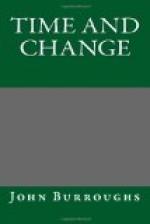One thing is certain, in a hygienic way I owe much to my excursions to Nature. They have helped to clothe me with health, if not with humility; they have helped sharpen and attune all my senses; they have kept my eyes in such good trim that they have not failed me for one moment during all the seventy-five years I have had them; they have made my sense of smell so keen that I have much pleasure in the wild, open-air perfumes, especially in the spring—the delicate breath of the blooming elms and maples and willows, the breath of the woods, of the pastures, of the shore. This keen, healthy sense of smell has made me abhor tobacco and flee from close rooms, and put the stench of cities behind me. I fancy that this whole world of wild, natural perfumes is lost to the tobacco-user and to the city-dweller. Senses trained in the open air are in tune with open-air objects; they are quick, delicate, and discriminating. When I go to town, my ear suffers as well as my nose: the impact of the city upon my senses is hard and dissonant; the ear is stunned, the nose is outraged, and the eye is confused. When I come back, I go to Nature to be soothed and healed, and to have my senses put in tune once more. I know that, as a rule, country or farming folk are not remarkable for the delicacy of their senses, but this is owing mainly to the benumbing and brutalizing effect of continued hard labor. It is their minds more than their bodies that suffer.
When I have dwelt in cities the country was always near by, and I used to get a bite of country soil at least once a week to keep my system normal.
Emerson says that “the day does not seem wholly profane in which we have given heed to some natural object.” If Emerson had stopped to qualify his remark, he would have added, if we give heed to it in the right spirit, if we give heed to it as a nature-lover and truth-seeker. Nature love as Emerson knew it, and as Wordsworth knew it, and as any of the choicer spirits of our time have known it, has distinctly a religious value. It does not come to a man or a woman who is wholly absorbed in selfish or worldly or material ends. Except ye become in a measure as little children, ye cannot enter the kingdom of Nature—as Audubon entered it, as Thoreau entered it, as Bryant and Amiel entered it, and as all those enter it who make it a resource in their lives and an instrument of their culture. The forms and creeds of religion change, but the sentiment of religion—the wonder and reverence and love we feel in the presence of the inscrutable universe—persists. Indeed, these seem to be renewing their life to-day in this growing love for all natural objects and in this increasing tenderness toward all forms of life. If we do not go to church so much as did our fathers, we go to the woods much more, and are much more inclined to make a temple of them than they were.




